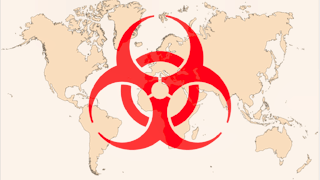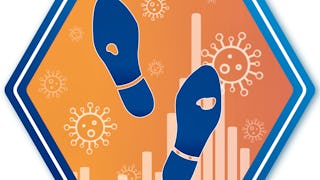Filter by
SubjectRequired
LanguageRequired
The language used throughout the course, in both instruction and assessments.
Learning ProductRequired
LevelRequired
DurationRequired
SkillsRequired
SubtitlesRequired
EducatorRequired
Explore the Epidemics Course Catalog
 Status: Preview
Status: PreviewThe University of Hong Kong
Skills you'll gain: Infectious Diseases, Epidemiology, Public Health and Disease Prevention, Public Health, Healthcare Ethics, Community Health, Emergency Response, Research, Immunology, Microbiology, Risk Analysis, Media and Communications
 Status: Preview
Status: PreviewThe Pennsylvania State University
Skills you'll gain: Infectious Diseases, Epidemiology, Public Health and Disease Prevention, Microbiology, Public Health, Pathology, Immunology, Preventative Care, Sanitation, Social Determinants Of Health, Social Sciences, Community Health, Molecular, Cellular, and Microbiology, Medical Science and Research, Biology, Drug Development, Social Network Analysis, Case Studies
 Status: Free Trial
Status: Free TrialJohns Hopkins University
Skills you'll gain: Epidemiology, Infectious Diseases, Risk Analysis, Public Health, Investigation, Case Studies, Laboratory Testing, Statistical Analysis, Research Methodologies, Statistics, Report Writing
 Status: Preview
Status: PreviewPolitecnico di Milano
Skills you'll gain: Public Health and Disease Prevention, Public Health, Environmental Science, Infectious Diseases, Preventative Care, Health Policy, Health Care Procedure and Regulation, Policty Analysis, Research, and Development, Climate Change Adaptation, Governance, Food Safety and Sanitation, Law, Regulation, and Compliance, Case Studies
 Status: Preview
Status: PreviewDartmouth College
Skills you'll gain: Infectious Diseases, Epidemiology, Infection Control, Public Health and Disease Prevention, Public Health, Healthcare Ethics, Health Care, Health Systems, Health Policy, Medical Science and Research, Liberal Arts, Cultural Sensitivity, Case Studies, Storytelling
 Status: Preview
Status: PreviewJohns Hopkins University
Skills you'll gain: Epidemiology, Health Disparities, Spatial Data Analysis, Data Visualization, Public Health, Geographic Information Systems, Data Analysis, Statistical Analysis, Infectious Diseases, Risk Analysis, Microsoft Excel
What brings you to Coursera today?
 Status: Free Trial
Status: Free TrialJohns Hopkins University
Skills you'll gain: Epidemiology, Public Health, Data Presentation, Public Health and Disease Prevention, Trend Analysis, Geographic Information Systems, Health Policy, Data Visualization Software, Chronic Diseases, GIS Software, Health Systems, Infectious Diseases, Biostatistics, Risk Analysis, Investigation, Health Care, Community Health, Data Analysis, Program Evaluation, Statistics
 Status: NewStatus: Free Trial
Status: NewStatus: Free TrialJohns Hopkins University
Skills you'll gain: Drug Development, Clinical Trials, Pharmaceuticals, Pharmacology, Pharmacotherapy, Clinical Research, Pharmacy, Patient Safety, Medical Prescription, Epidemiology, Research Design, Contraindication, Health Policy, Research Methodologies, Medical Science and Research, Drug Interaction, Science and Research, Program Evaluation, Public Health, Data Analysis
 Status: Free Trial
Status: Free TrialImperial College London
Skills you'll gain: Epidemiology, Diagnostic Tests, Research Design, Public Health and Disease Prevention, Biostatistics, Clinical Research, Public Health, Preventative Care, Data Collection, Research Methodologies, Program Evaluation, Risk Analysis, Quantitative Research, Health Policy, Correlation Analysis, Statistical Analysis, Statistical Methods, Research, Sample Size Determination, Data Analysis
 Status: Free Trial
Status: Free TrialImperial College London
Skills you'll gain: Immunology, Infectious Diseases, Molecular Biology, Epidemiology, Microbiology, Public Health, Drug Development, Biotechnology, Medical Science and Research, Climate Change Programs, Cell Biology, Health Disparities, Biology, Clinical Trials, Laboratory Research, Pharmacology, Public Health and Disease Prevention, New Product Development, Emerging Technologies, Manufacturing Processes
 Status: Free Trial
Status: Free TrialImperial College London
Skills you'll gain: Infectious Diseases, Epidemiology, Public Health, Microbiology, Health Disparities, Community Health, Social Determinants Of Health, Preventative Care, Health Care, Health Policy, Public Policies, Trend Analysis, Immunology
 Status: Preview
Status: PreviewStanford University
Skills you'll gain: Cooking, Meal Planning And Preparation, Nutrition and Diet, Health Education, Food and Beverage, Behavioral Health, Chronic Diseases, Health Informatics
Epidemics learners also search
In summary, here are 10 of our most popular epidemics courses
- Epidemics: The University of Hong Kong
- Epidemics - the Dynamics of Infectious Diseases: The Pennsylvania State University
- Outbreaks and Epidemics: Johns Hopkins University
- One Health: Pandemic preparedness, prevention, and response: Politecnico di Milano
- Reflections from 40 Years Fighting International Epidemics: Dartmouth College
- Investigating Epidemics like COVID-19: An Analyst's Guide: Johns Hopkins University
- Epidemiology in Public Health Practice: Johns Hopkins University
- Drug Development and Pharmacoepidemiology: Johns Hopkins University
- Epidemiology for Public Health: Imperial College London
- Foundations in Virology and Vaccinology: Imperial College London










